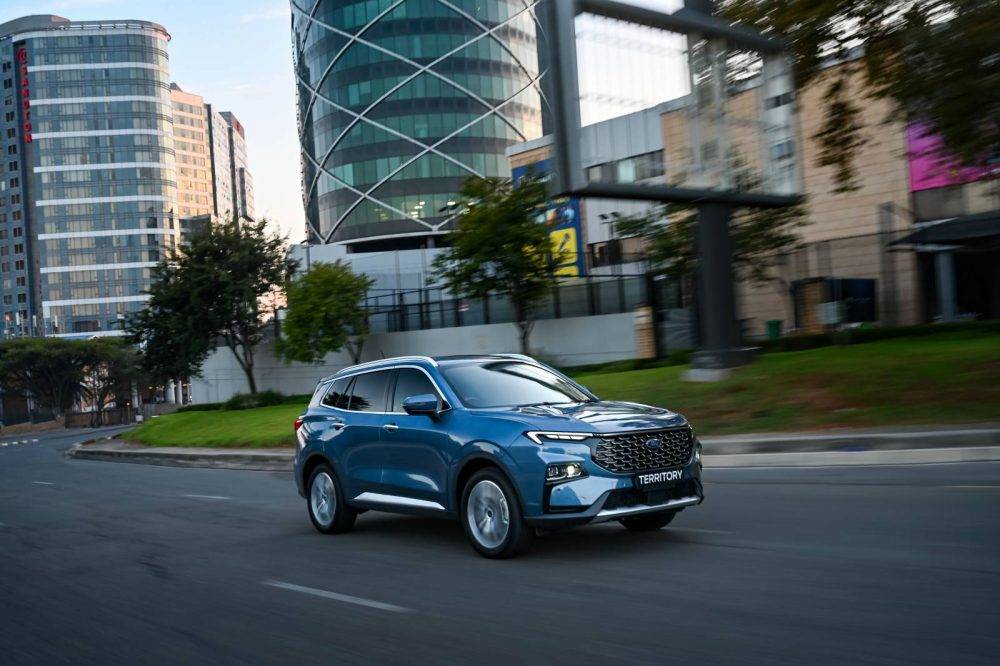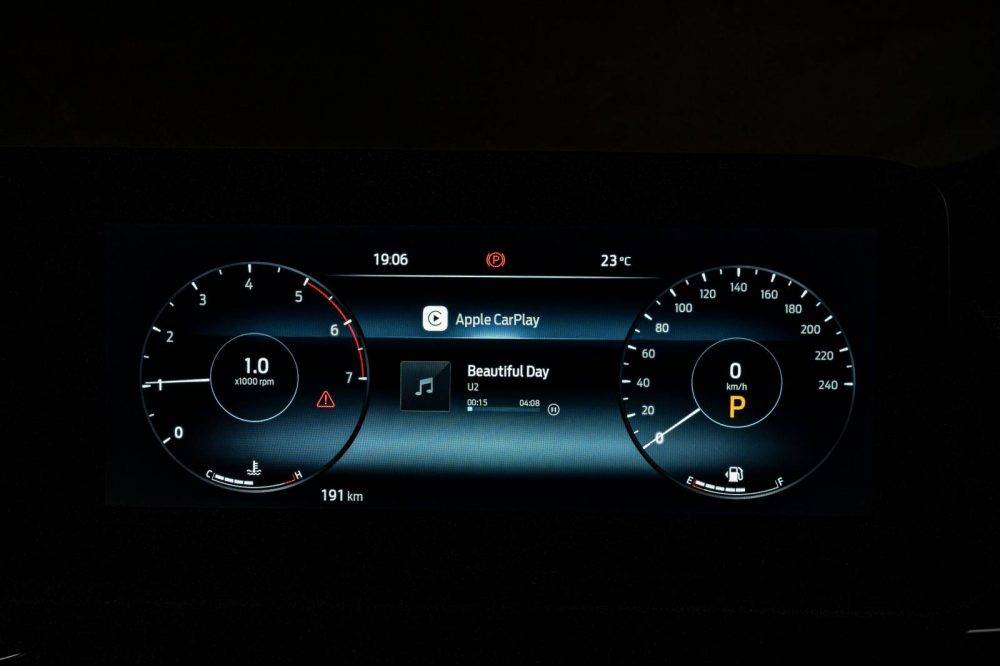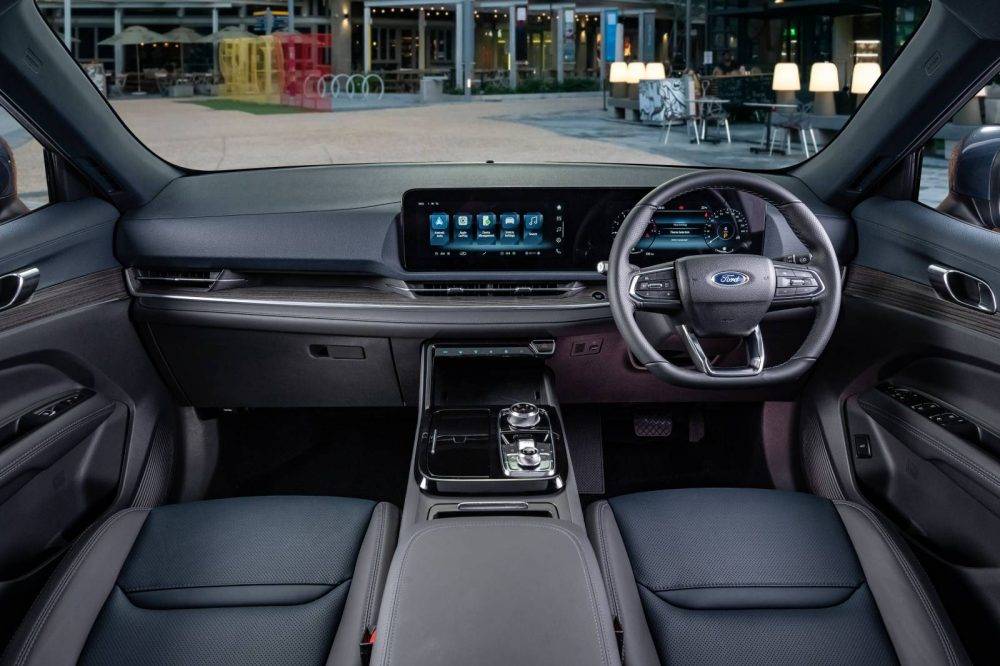The Territory is Ford’s most recent passenger vehicle entry into the South African market, having launched the Ford Puma earlier this year.
Where the Puma sought to take on the compact SUV segment, its price makes it a difficult proposition. The Ford Territory you see here, however, will certainly fare better when it comes to sales.
It still has its work cut out for it in the largest SUV segment there is, the burgeoning C-SUV landscape, which is responsible for about 13% of the market share.
Let’s get the fast facts out of the way. The Territory is now available at local dealers at a starting price of R590 000 for the base Ambiente 1.8-litre EcoBoost. The Trend and Titanium models come in at R646 600 and R721 000, respectively.

There is only one powertrain available across the range — a 1.8-litre turbo-petrol motor that develops 138kW and 318Nm. This is coupled to a seven-speed dual-clutch transmission (DCT).
With that done, let’s talk about the elephant in the room. The Territory is the only Ford SA vehicle sourced and built in China. It was essentially a business decision to partner with Chinese firm JMC to build the Territory on Ford’s behalf.
At base, the Territory begins life as a JMC-built SUV that Ford has then embellished and amplified to make the product feel like a Ford — and I’m happy to report that they’ve done a very good job.
If you were worried about the idea of the Territory being sourced and built in China in this way, don’t be. The Territory does feel like a Ford product and that’s not just in tactile and perceived in-car material, but also in the way it drives.
That 1.8-litre engine is sufficiently powerful and, coupled with the DCT, you won’t find the vehicle lacking in power, for the most part.

The ride is suitably supple for a family-oriented product, with commendable dynamic ability and not nearly as much body roll as you might expect. It does drive well.
As far as refinement levels are concerned, that too is worth commending, coupled with a well-packaged interior layout that sees excellent legroom and headroom for adult passengers.
Perhaps this has compromised luggage space, with Ford claiming a 448-litre boot that can stretch to 1 422-litres with the seats folded down. It certainly seems the boot can swallow more than that, but for now, we’ll take Ford’s word for it.
The Territory does come with a spare wheel but not a full-sized item.
Features are aplenty across each derivative. The Ambiente boasts a strong list of standard features including Apple CarPlay and Android Auto connectivity in a 12.3-inch touchscreen infotainment system.
I’m not the biggest fan of housing almost all in-car functions on a touchscreen and it’s no different with the Territory.
Certain functions, such as climate control shortcuts, have been adopted across a panel under the screen itself, but you’re still likely to touch the screen to adjust the temperature. Putting this on the shortcut panel would make better sense.
Adding to the features are niceties such as tyre-pressure monitor, keyless access and cruise control.

The mid-spec Trend offers further convenience niceties, such as follow-me-home lights, which momentarily remain on after you have switched off the engine and locked the car; a reverse camera; auto headlamps and wipers; as well as wireless charging and a powered tailgate.
The range-topping Titanium adds smarter 19-inch wheels, electric driver’s seat adjustment, a panoramic roof and a whole list of safety features that come within the adaptive cruise control suite, such as lane-keeping assistance, blind-spot information system, emergency braking and a new alert feature that warns you of oncoming traffic before you open the door.
Family cars in South Africa are often subjected to towing some sort of trailer or caravan and the Territory is capable of doing that with a rating of 1 310kg.
When discussing the Territory’s driving dynamics and feel, Ford’s managing director, Neale Hill, was quick to point out the marque’s “trust markers” on any vehicle they import.
These are the absolutes, the things that they’re not willing to compromise on that make a Ford feel like a Ford. The Territory is proof so far that these have been adhered to.
Current Ford owners might notice an infotainment system, driver’s display or cabin layout is unfamiliar, but apart from this, the Territory doesn’t look, drive or feel unlike a Ford. And that’s about as good as Ford could have hoped for.
The SUV market remains as fierce as ever. Some competitors are cheaper, faster, more fuel-efficient or more spacious in some areas, but none trumps the Ford Territory on all fronts.
This car has a good balance of value and is priced on the lower-to-middle end of the pricing spectrum.
By all accounts, it seems as if the sales numbers will look a lot stronger with this one.